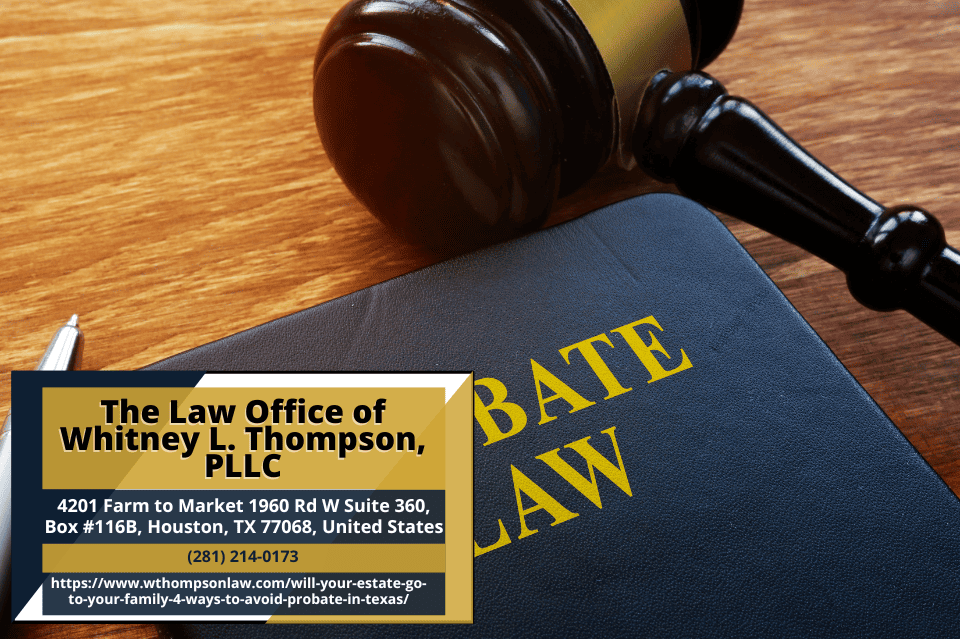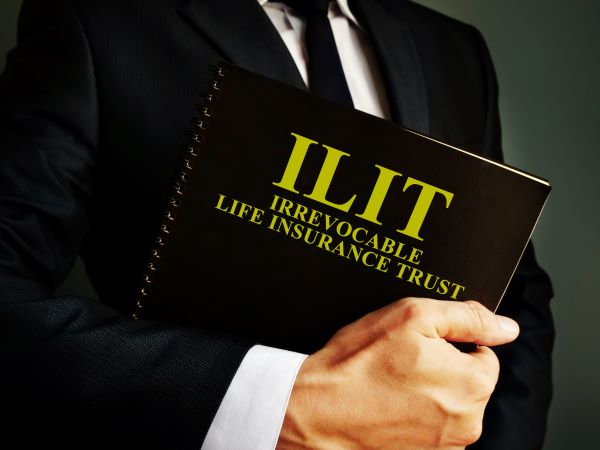When it comes to safeguarding your legacy and ensuring your assets are distributed according to your wishes, understanding the probate process, whether it’s probate with a will or without, is crucial. In Texas, probate can be a lengthy legal procedure that your family might face after your passing. However, with strategic planning, it is possible to bypass this process altogether, allowing your estate to transition smoothly to your loved ones without the need for court intervention.
Are you considering estate planning options to avoid probate and to protect your estate, but unsure where to start? A knowledgeable probate attorney can offer invaluable assistance. At The Law Office of Whitney L. Thompson, PLLC, our team of Houston probate lawyers may be able to help tailor an estate plan that fits your unique situation, giving you peace of mind that your assets will be secured for your family’s future. Don’t let probate law leave your loved ones in a lurch. Contact us today at (281) 214-0173 to take the next steps forward with confidence and a sense of security that your estate will be passed on without unnecessary delay or expense.
Texas Probate: The Process
Probate is the legal process by which the court receives a decedent’s Will and Testament. This process allows the court to open an estate and appoint an administrator or executor. At the hearing, the court will determine whether or not the estate is subject to court scrutiny. After the hearing, the court will instruct the executor/administrator to collaborate with the lawyer in order to determine the assets and liabilities of the estate and distribute them to the beneficiaries.
The probate process usually begins with the submission of the original will. The court will then seek to validate the will. After the will is deemed valid, the probate court will name someone to manage the estate and supervise the probate proceedings. This role is referred to as the “independent executor”.
Most of the time, the executor is named in the original Will. Once an administrator is appointed, they must notify all creditors by providing evidence of the decedent’s death. The administrator will pay all valid claims, and then distribute any remaining property to the beneficiaries, according to the will.
In order to understand the probate process better, it is important to speak with an experienced probate attorney. A skilled estate planning lawyer may be able to help you go through the process smoothly and ensure that the estate is distributed according to the Will. Contact The Law Office of Whitney L. Thompson, PLLC, today to speak with an experienced probate lawyer.
How Can You Avoid Probate for Your Family’s Estate?
Avoid probate in Texas by creating a living trust, using payable-on-death accounts, filing transfer-on-death deeds, and designating beneficiaries on insurance or retirement accounts. These tools allow assets to pass directly to heirs without court involvement, saving time and legal costs.
| Option | Description |
|---|---|
| Joint Ownership of Property | Property jointly owned with rights of survivorship. |
| Bank Account Payable on Death Designation | Designate a beneficiary for bank accounts. |
| Real Estate Transfer on Death Deed | Transfer real estate to someone upon death. |
| Living Trust | Create a trust to transfer assets to beneficiaries. |
Joint Ownership of Property
One of the benefits of owning property jointly is that when one of the owners passes away, the other doesn’t have to worry about that piece of property going to someone else after probate. The catch is that you have to have “rights of survivorship,” or else the property could be subject to a court decision.
Texas has two forms of joint ownership that include these rights, joint tenancy and survivorship community property.
Joint tenancy is useful for couples (no marriage necessary) who want to own property together. Real estate, automobiles, bank accounts, and other property can be owned in a joint tenancy. To avoid probate in Texas with a joint tenancy, couples must sign a joint tenancy agreement.
Survivorship community property operates in much the same way, though it is exclusively for married couples.

Bank Account Payable on Death Designation
Texas also allows bank account holders to designate someone to receive their money after they die. Known as a payable-on-death designation, this way of avoiding probate allows account holders to control their money while knowing that it won’t go through probate if they pass away.
Real Estate Transfer on Death Deed
Also known as beneficiary deeds, transfer-on-death deeds for real estate give home and business owners the option to transfer their real estate to someone else following their death. Property owners can revoke the deed or sell the property whenever they want as this deed does not take effect until they are deceased.
Living Trust
Living trusts are a great way to avoid probate in Texas. Nearly any sort of property can be protected by a trust, so it’s a great way for property owners to transfer houses, cars, bank accounts, and other valuable assets to their beneficiaries without getting the court involved. All you have to do is create the trust, name a successor trustee, and give yourself ownership of the property within the trust. After all that is done, the property will follow the rules of the trust, so be sure to speak to an experienced attorney before creating a living trust. Upon your death, the property will transfer to the successor trustee who can then distribute the property to your beneficiaries without going through probate.
How to Pass on Retirement Accounts, Life Insurance, and Investments Without Probate
Certain assets, such as retirement accounts, life insurance policies, and investment funds, can bypass probate in Texas if structured correctly. These types of assets are often classified as nonprobate property, meaning they transfer directly to beneficiaries without court involvement.
For retirement accounts, such as IRAs and 401(k)s, you name a beneficiary directly with the account custodian. Upon your death, the funds pass to the designated person according to the account agreement. Texas, as a community property state, requires special attention here; if you are married, your spouse typically has a community property interest in retirement contributions made during marriage. For certain retirement plans like 401(k)s, your spouse may need to consent in writing if you’re designating someone else as beneficiary. Without a beneficiary designation or if the named beneficiary is deceased, the account proceeds may enter probate.
Life insurance proceeds similarly bypass probate, transferring directly to the named beneficiary. If no living beneficiary exists, proceeds may be paid into your estate, making them subject to probate.
For investments such as stocks, bonds, and mutual funds, Texas recognizes transfer-on-death (TOD) and payable-on-death (POD) designations. Adding a TOD or POD designation to your account ensures that these assets pass directly to your chosen beneficiaries upon death, bypassing probate. However, these assets may still be subject to claims from the creditors of your estate.
It’s crucial to keep beneficiary designations current, particularly following significant life events like marriage, divorce, or the birth of a child. For minors or special-needs beneficiaries, consider using a trust as the beneficiary rather than naming the individual directly. Properly designated assets will bypass the probate courts, allowing for a quicker transfer to your chosen recipients.
What Happens if You Don’t Probate a Will in Texas?
Failing to probate a will in Texas can result in significant legal issues. If a will is not probated within four years of the individual’s death, the estate may be treated as though no will ever existed. In such cases, Texas intestacy laws determine how assets are distributed, which may not align with the deceased’s intended wishes. This could result in heirs receiving different portions than intended, potentially leading to disputes.
Without probate, the legal ownership of assets remains uncertain. Beneficiaries may face difficulties accessing bank accounts, transferring property, or managing other assets. Additionally, unresolved debts and taxes can accumulate, placing financial burdens on both the estate and its beneficiaries.
The probate process also plays a crucial role in settling creditors’ claims. If probate is avoided, creditors may pursue repayment from the estate or even the beneficiaries directly, leading to further complications. Probate ensures that these claims are handled properly, providing a structured way to settle debts.
However, there are ways to avoid probate while still ensuring your estate is managed efficiently. Using trusts, joint ownership, or designating beneficiaries for certain assets are common strategies that allow for direct transfers, bypassing the probate process. These steps can help your loved ones avoid legal complications and ensure that your wishes are fulfilled without the delays and challenges of probate.
How Frequently Should Texas Residents Review Their Probate Avoidance Strategies?
Texas residents should review their probate avoidance strategies every 3 to 5 years or after major life events like marriage, divorce, death in the family, or a significant asset change. Regular reviews ensure estate plans remain legally valid and aligned with current goals and Texas laws.
Want to Avoid Probate in Texas? Get in Touch with Us Today.
Effective estate planning provides pathways for your assets to reach your family directly, bypassing the Texas probate system. Common strategies, such as living trusts and correctly established account designations, are designed to transfer property to your chosen beneficiaries without court involvement. Applying these methods thoughtfully can offer substantial peace of mind and see that your intentions for your legacy are honored.
A Houston probate lawyer at The Law Office of Whitney L. Thompson, PLLC, can offer personalized assistance to apply these approaches to your circumstances. Our team is prepared to help you review the options and create a plan that preserves your legacy for your loved ones. To take the next step in protecting your estate, contact us at (281) 214-0173.







